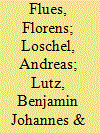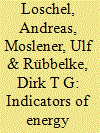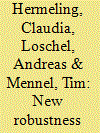|
|
|
Sort Order |
|
|
|
Items / Page
|
|
|
|
|
|
|
| Srl | Item |
| 1 |
ID:
136193


|
|
|
|
|
| Summary/Abstract |
We assess recent Chinese climate policy proposals in a multi-region, multi-sector computable general equilibrium model with a Chinese carbon emissions trading scheme (ETS). When the emissions intensity per GDP in 2020 is required to be 45% lower than in 2005, the model simulations indicate that the climate policy induced welfare loss in 2020, measured as the level of GDP and welfare in 2020 under climate policy relative to their level under business-as-usual (BAU) in the same year, is about 1%. The Chinese welfare loss in 2020 slightly increases in the Chinese rate of economic growth in 2020. When keeping the emissions target fixed at the 2020 level after 2020 in absolute terms, the welfare loss will reach about 2% in 2030. If China׳s annual economic growth rate is 0.5 percentage points higher (lower), the climate policy-induced welfare loss in 2030 will rise (decline) by about 0.5 percentage points. Full auctioning of carbon allowances results in very similar macroeconomic effects as free allocation, but full auctioning leads to higher reductions in output than free allocation for ETS sectors. Linking the Chinese to the European ETS and restricting the transfer volume to one third of the EU׳s reduction effort creates at best a small benefit for China, yet with smaller sectoral output reductions than auctioning. These results highlight the importance of designing the Chinese ETS wisely.
|
|
|
|
|
|
|
|
|
|
|
|
|
|
|
|
| 2 |
ID:
136203


|
|
|
|
|
| Summary/Abstract |
The European Union׳s current climate and energy policy has to operate under an ex ante unforeseen economic crisis. As a consequence prices for carbon emission allowances in the EU Emissions Trading System collapsed. However, this price collapse may be amplified by the interaction of a carbon emission cap with supplementary policy targets such as minimum shares for renewables in the power sector. The static interaction between climate and renewable policies has been discussed extensively. This paper extends this debate by analysing the efficiency and effectiveness of a policy portfolio containing a cap and trade scheme and a target for a minimum renewable share in different states of aggregate electricity demand. Making use of a simple partial equilibrium model of the power sector we identify an asymmetric interaction of emissions trading and renewable quotas with respect to different states of aggregate electricity demand. The results imply that unintended consequences of the policy interaction may be particularly severe and costly when aggregate electricity demand is low and that carbon prices are more sensitive to changes in economic activity if they are applied in combination with renewable energy targets. Our analysis of the policy interaction focuses on the EU, yet the conclusions may also be of relevance for fast growing emerging economies like China.
|
|
|
|
|
|
|
|
|
|
|
|
|
|
|
|
| 3 |
ID:
119796


|
|
|
|
|
| Publication |
2013.
|
| Summary/Abstract |
We carry out a detailed computable general equilibrium (CGE) analysis of the EU Decarbonisation Roadmap 2050 on a macroeconomic and on a sectoral level. Herein, we study a Reference scenario that implements existing EU policies as well as 3 unilateral and 3 global climate action scenarios. We identify global climate action with international emissions trading and the full equalisation of CO2 prices across all (EU) sectors as an economically reasonable policy option to avoid additional costs of the Decarbonisation Roadmap to a large extent. This policy option may include CDM (Clean Development Mechanism in the sense of 'where'-flexibility) in an extended form if there are countries without emissions caps. Moreover, we identify diverse sectoral effects in terms of output, investment, emissions and international competitiveness. We conclude that the successful realisation of the EU Decarbonisation Roadmap probably requires a wise and joint consideration of technology, policy design and sectoral aspects.
|
|
|
|
|
|
|
|
|
|
|
|
|
|
|
|
| 4 |
ID:
094836


|
|
|
|
|
| Publication |
2010.
|
| Summary/Abstract |
Energy security has become a popular catch phrase, both in the scientific arena as well as in the political discussion. Yet, in general the applied concepts of energy security are rather vague. This paper sheds some light on concepts and indicators of energy security. First, we conceptually discuss the issue of energy supply security and explain why it is not to handle by one science alone and what economics may contribute in order to structure the topic. After providing a brief survey of existing attempts to define or measure energy security we suggest an additional dimension along which indicators of energy security may be classified: ex-post and ex-ante indicators. Finally, we illustrate our concept on the basis of several simplified indicators. While ex-post indicators are mostly based on price developments, ex-ante indicators are to a greater extent aimed at illustrating potential problems. Our illustration suggests that it is worthwhile to take into account the market structure along with the political stability of exporting countries.
|
|
|
|
|
|
|
|
|
|
|
|
|
|
|
|
| 5 |
ID:
119782


|
|
|
|
|
| Publication |
2013.
|
| Summary/Abstract |
This paper introduces a new method for stochastic sensitivity analysis for computable general equilibrium (CGE) model based on Gauss Quadrature and applies it to check the robustness of a large-scale climate policy evaluation. The revised version of the Gauss-quadrature approach to sensitivity analysis reduces computations considerably vis-à-vis the commonly applied Monte-Carlo methods; this allows for a stochastic sensitivity analysis also for large scale models and multi-dimensional changes of parameters. In the application, an impact assessment of EU2020 climate policy, we focus on sectoral elasticities that are part of the basic parameters of the model and have been recently determined by econometric estimation, alongside with standard errors. The impact assessment is based on the large scale CGE model PACE. We show the applicability of the Gauss-quadrature approach and confirm the robustness of the impact assessment with the PACE model. The variance of the central model outcomes is smaller than their mean by order four to eight, depending on the aggregation level (i.e. aggregate variables such as GDP show a smaller variance than sectoral output).
|
|
|
|
|
|
|
|
|
|
|
|
|
|
|
|
|
|
|
|
|